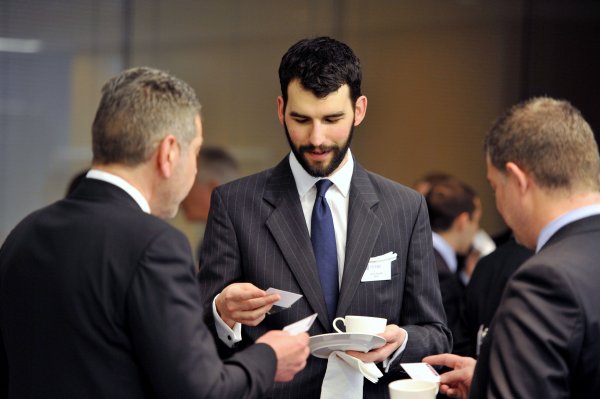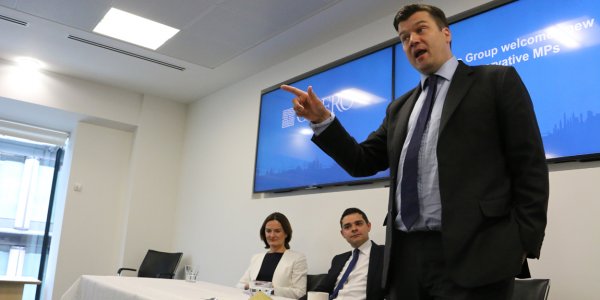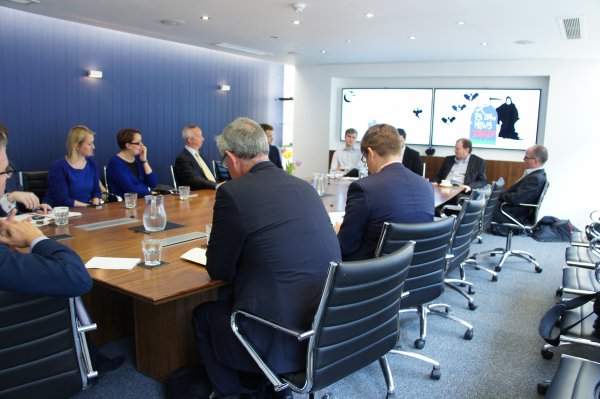Business Culture: Business Meetings
Business culture in the United Kingdom treads a delicate line between formality and relaxed courtesy. Though customs vary in different companies, and often depend on the age of the executives, it is important to be sensitive to the nuances of British behavior when dealing with British business counterparts. Negotiations and business meetings are usually conducted in an open atmosphere of reciprocity and cooperation. However, there is also a definite protocol of formality, and it is important not to relax your demeanor, at least not until your British counterpart does so first.
Preparation
It is helpful, though not absolutely necessary, to make initial contact with your business counterparts through an intermediary. British businesspeople will do business with people they have just met, as long as both sides are willing to work toward a more solid relationship. Nevertheless, it always helps to have someone introduce you; if this can’t be done in person, a letter of introduction can also help smooth the way.
Send some background material to help your future counterparts become familiar with your company. It is also a good idea to send a basic agenda in advance. Don’t be too thorough, however; avoid giving the impression that you plan to call all the shots.
British businesspeople are often monolingual. If your English is not up to par, consider hiring a translator for your meeting. A translator who is multicultural as well as multilingual can be especially helpful in explaining the nuances of behavior as well as language. It is always advisable to hire someone whose native language is the language that you speak, to ensure that he or she can explain to your full understanding.
Scheduling
Meetings should be scheduled a few weeks in advance. Be prepared to phone back and forth with your counterpart’s secretary before setting an exact time. After the meeting is scheduled, confirm the time in writing via fax or e-mail.
Be prompt. Arriving a few minutes early is preferable and will signal that you are serious about establishing a relationship with your British counterparts. If you are leading the meeting, begin within a few minutes after the scheduled time, without giving the impression that you are in a rush.
British businesspeople are often reluctant to bring meetings to a close. They may not want to seem rude and so they will wait for you to signal the end. If the discussion seems to peter out, tactfully suggest that you end for the day. Don’t be too abrupt, though.
Business hours are from 9 or 9:30a.m. to 5 or 6p.m. Avoid scheduling meetings during the summer, as most executives take off from two to four weeks in July or August. Most businesses are closed on Christmas and New Year’s, as well as Good Friday and Easter. Nearly a dozen bank and other public holidays occur at different dates each year, some statutory and some by proclamation. You should check these dates at www.bank-holidays.co.uk .
Business Attire
British businesspeople dress in formal business attire. Men wear dark suits and ties. Avoid striped ties, as they resemble official British school ties and may look odd on a grown man from another country. Women wear dark colors; an occasional bright color is acceptable for work, but not for meetings. Female executives usually wear skirt suits; pants are reserved for secretaries and personal assistants.
Meeting Protocol
Entering the Meeting Room: Hierarchy
It is often difficult to tell who is who on the British team. Senior members will not necessarily come forth immediately, nor will you be able to tell who they are based on dress or demeanor. The British company may bring additional representatives to the meeting unannounced. These can include secretaries; public relations, marketing, or sales personnel; lawyers; or representatives of the company’s branch in the EU.
Introductions
Members of the team should be introduced individually with their titles and a brief explanation of their responsibilities and reasons for attending the meeting.
Conventional greetings are, "Pleased to meet you" and "How do you do?" When asked the latter, respond with the same phrase.
Forms of Address
The British are quite formal when it comes to names in the business world. Use Mr. and Miss or Mrs. along with your counterpart’s last name. Aristocratic titles such as Lord or Lady should be used when applicable. Don’t overemphasize the title, though.
Never call someone by a first name unless you are invited to. Be aware that nicknames, which may be common in other English-speaking countries, may be abhorrent to English speakers in the U.K.—don’t shorten William to Bill or use Bob for Robert, for example.
Business Cards
Your British counterparts may wait to be asked before giving you their card. Be prepared that when you offer your card, you may not receive one in return. Business cards in the U.K. don’t always follow common standards, and may be smaller, larger, or have different proportions than ones you are used to.
If the card you receive does not have an e-mail address on it, don’t ask for one. Some British businesspeople, especially older ones, view the Internet as an American fad and may resent the assumption that they use it for business.
Body Language
Body language is similar to that in other Western cultures. Lean forward to show that you are interested, and back to show that you are not. People usually stand about a meter apart. Crossing your legs is acceptable only if the rest of your posture indicates a businesslike demeanor. Avoid looking too relaxed. Chewing gum at a meeting or blowing your nose in public are considered bad manners.
Avoid large hand-gestures, which the British frown upon. Your British counterparts may offer a light handshake in contrast to a heartier version. Avoid physical contact; even a pat on the shoulder could be seen as presumptuous. Though a small degree of eye contact is important to express sincerity, don’t stare or gaze at your counterpart’s face for too long. Pointing is considered rude; instead, indicate someone or something by tilting your head.
Meeting Starters: Small Talk versus "Getting Down to Business"
Meetings begin with small talk, often for a few minutes prior to the scheduled meeting time. Make sure to arrive a few minutes early so that you can participate. Small talk should be friendly, but not too personal. Talk about the weather or the headlines, but don’t ask too many personal questions about your counterparts’ lives and families.
Your counterparts will expect the meeting to begin efficiently once the small talk is dispensed with, usually within the first few minutes. You should begin the meeting with a detailed agenda outlining what will be discussed, and then proceed to follow the schedule point by point.
Conducting the Meeting
Make your presentation efficiently, but don’t rush. Begin by outlining your proposal, then explain the goals of the meeting and of negotiations as a whole. Avoid making major predictions, or dictating to the British team. Your British counterparts will be put off if you appear too self-assured.
When you have the floor, make some attempt at personal conversation. Comments about the weather or your trip are good choices. Don’t be too casual though; your British counterparts may perceive casual behavior as trying too hard.
It is important to convey that you are interested in your counterparts’ thoughts and ideas. Pause briefly throughout your presentation to leave time for questions. Take notes when your British counterparts present or ask questions to convey that you are seriously interested in pursuing the business deal.
Conclude the meeting with a summary of what was accomplished. Go over all decisions, commitments, new responsibilities, and deadlines.
Decision Making
There is no single model for decision making in British companies. Older, more traditional companies often follow a more rigid hierarchy in which only top executives make decisions. Other companies may delegate responsibilities among the lower ranks of the company.
In general, though, decision makers consult others before coming to a final conclusion. Successful interaction with members at any level of a company can be essential to the success of your business proposal. Be sure to treat everyone with courtesy and respect, as you do not know who will have a say in the final decision.
Gifts and Splitting the Bill
Gifts are not generally exchanged in business settings. A small gift is acceptable but should be business related, preferably something with the company logo, such as a pen or a calendar. Don’t overdo it, though. Your business counterpart will be more interested in getting down to business. Once a business relationship is established, it is acceptable to offer a more substantial gift, often geared for children. For example, a publishing company could offer a selection of children’s books, or a sporting goods company could give some sports jerseys.
If you are invited to someone’s home, a small gift of chocolate or flowers is appropriate. Avoid bringing roses, as they have a romantic connotation.
Do not expect to discuss business over lunch or dinner; the British don’t usually mix business with pleasure. You may be invited to share a meal to help the two sides get better acquainted. If your meeting is scheduled between 11a.m. and 1p.m., expect that you may be invited for lunch at the last minute. Don’t introduce business talk unless your counterpart does, and make sure to reciprocate. In England, the host pays the bill.
Although you may not be invited home for dinner, British executives may invite you to join them for a weekend at a country house. In this case, bring a gift that everyone can enjoy, such as expensive chocolates or wine.
Follow-up
Meetings should be followed up with a written memo recording the key points that were discussed. Many meetings conclude with oral agreements on both sides. Be aware that these agreements may be subject to change. Your counterparts may need to receive approval from senior executives before the deal can become final.
Always follow up initial meetings in order to solidify agreements. Once a contract is signed, often the highest-level person at the meeting will delegate execution of the details to subordinates. Find out who the executors are, how they want to be contacted, what needs to be done, and when.
Copyright © 1993—2024 World Trade Press. All rights reserved.

 United Kingdom
United Kingdom 



